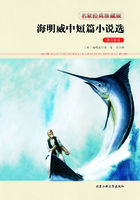
第3章 Old Man at the Bridge 坐在桥边的老人
An old man with steel rimmed spectacles and very dusty clothes sat by the side of the road. There was a pontoon bridge across the river and carts, trucks, and men, women and children were crossing it. The mule-drawn carts staggered up the steep bank from the bridge with soldiers helping push against the spokes of the wheels. The trucks ground up and away heading out of it all and the peasants plodded along in the ankle deep dust. But the old man sat there without moving. He was too tired to go any farther.
It was my business to cross the bridge, explore the bridgehead beyond and find out to what point the enemy had advanced. I did this and returned over the bridge. There were not so many carts now and very few people on foot, but the old man was still there.
“Where do you come from?”I asked him.
“From San Carlos,”he said, and smiled.
That was his native town and so it gave him pleasure to mention it and he smiled.
“I was taking care of animals,”he explained.
“Oh,”I said, not quite understanding.
“Yes,”he said,“I stayed, you see, taking care of animals. I was the last one to leave the town of San Carlos.”
He did not look like a shepherd nor a herdsman and I looked at his black dusty clothes and his gray dusty face and his steel rimmed spectacles and said,“What animals were they?”
“Various animals,”he said, and shook his head.“I had to leave them.”
I was watching the bridge and the African looking country of the Ebro Delta and wondering how long now it would be before we would see the enemy, and listening all the while for the first noises that would signal that ever mysterious event called contact, and the old man still sat there.
“What animals were they?”I asked.
“There were three animals altogether,”he explained.“There were two goats and a cat and then there were four pairs of pigeons.”
“And you had to leave them?”I asked.
“Yes. Because of the artillery. The captain told me to go because of the artillery.”
“And you have no family?”I asked, watching the far end of the bridge where a few last carts were hurrying down the slope of the bank.
“No,”he said,“only the animals I stated. The cat, of course, will be all right. A cat can look out for itself, but I cannot think what will become of the others.”
“What politics have you?”I asked.
“I am without politics,”he said.“I am seventy-six years old. I have come twelve kilometers now and I think now I can go no further.”
“This is not a good place to stop,”I said.“If you can make it, there are trucks up the road where it forks for Tortosa.”
“I will wait a while,”he said,“and then I will go. Where do the trucks go?”
“Towards Barcelona,”I told him.
“I know no one in that direction,”he said,“but thank you very much. Thank you again very much.”
He looked at me very blankly and tiredly, then said, having to share his worry with some one,“The cat will be all right, I am sure. There is no need to be unquiet about the cat. But the others. Now what do you think about the others?”
“Why they'll probably come through it all right.”
“You think so?”
“Why not,”I said, watching the far bank where now there were no carts.
“But what will they do under the artillery when I was told to leave because of the artillery?”
“Did you leave the dove cage unlocked?”I asked.
“Yes.”
“Then they'll fly.”
“Yes, certainly they'll fly. But the others. It's better not to think about the others,”he said.
“If you are rested I would go,”I urged.“Get up and try to walk now.”
“Thank you,”he said and got to his feet, swayed from side to side and then sat down backwards in the dust.
“I was taking care of animals,”he said dully, but no longer to me.“I was only taking care of animals.”
There was nothing to do about him. It was Easter Sunday and the Fascists were advancing toward the Ebro. It was a gray overcast day with a low ceiling so their planes were not up. That and the fact that cats know how to look after themselves was all the good luck that old man would ever have.
一位戴着钢丝边眼镜、衣服满是灰尘的老人坐在路边。河上有一座浮桥,骡子车、卡车,以及男女老少正在过桥。骡子拉的双轮车摇摇晃晃从桥上爬上陡岸,士兵们顶着轮辐在帮着推车。卡车轰隆隆地驶上陡岸,脱离开这一群向前驶去,农民们在脚踝深的尘土中沉重而缓慢地向前走。但是,老人坐在那里没动。他累得走不动了。
我的任务是过桥侦察远处的桥头堡,查明敌人推进到了什么位置。完成这个,我就过桥返回。这时,车辆已经没有那么多了,行人也寥寥无几,但老人还在那里。
“你从哪里来?”我问他。
“从圣卡洛斯城。”说着,他微微一笑。
那是他的家乡,所以提到它,他就很高兴,他露出了微笑。
“我原来是在照看动物。”他解释说。
“噢。”我说,没有完全明白。
“是的,”他说,“我留下来照看那些动物。我是最后一个离开圣卡洛斯城的。”
他看上去既不像牧羊人,也不像放牛人。我看了看他沾满尘土的黑衣服、满是尘土的灰色面孔和钢丝边眼镜,问道:“它们是什么动物?”
“各种各样的动物,”他说着,摇了摇头,“我不得不丢下它们。”
我注视着浮桥和看上去像非洲的埃布罗河三角洲的乡野,想知道要过多久才会看到敌人,同时一直侧耳倾听,等待那第一阵的嘈杂声,嘈杂声预示着那个永远神秘莫测的所谓接触的事件的到来,而老人还坐在那里。
“它们是什么动物?”我问。
“总共有三种动物,”他解释说,“有两只山羊、一只猫,然后还有四对鸽子。”
“而你只得丢下它们,是吗?”我问。
“是,是因为那些大炮。那个上尉叫我走,就是因为那些大炮。”
“那你没有家吗?”我注视着浮桥的另一端问,那里最后几辆骡子车正匆匆驶下岸坡。
“没有,”他说,“只有我刚才说过的那些动物。当然,那只猫不会有问题。猫能照顾自己,但我想不出别的那些动物会怎么样。”
“你有什么政见?”我问。
“我跟政见无关,”他说,“我七十六岁了,我现在已经走了十二公里,我想我现在再也走不动了。”
“这不是一个久留的好地方,”我说,“如果你能走过去的话,在岔口向托尔托萨的那条路上就有卡车。”
“我要等一会儿,”他说,“然后再走,卡车去哪里?”
“去巴塞罗那。”我告诉他。
“朝那个方向去,我一个人都不认识,”他说,“不过,非常感谢你,再次非常感谢你。”
他非常茫然而又疲惫地看着我,随后觉得要有个人和他分担他的忧愁,就说道:“猫会平安无事,我敢保证。不必为猫担心。可是,还有别的那些动物。你认为别的那些动物会怎么样?”
“啊,它们说不定会平安脱险的。”
“你认为是这样吗?”
“何尝不是呢。”我注视着远处的河岸说,那里现在没有骡子车了。
“可是,它们在炮火下怎么办?他们叫我走,就是因为那些大炮。”
“你没有锁上鸽笼吗?”我问。
“没有。”
“那它们会飞走的。”
“是的,它们当然会飞。可是,还有别的那些动物。最好还是不要去想别的那些动物。”他说。
“要是你歇够的话,我就要走了,”我催促道,“现在起来,试着走走看。”
“谢谢你。”他说着站起来,左右摇晃了一下,然后又倒退着在尘土里坐下来。
“我原来是在照看动物,”他木然地说,但不再是对我说,“我只是在照看动物。”
我对他毫无办法了。那天是复活节,法西斯军队正在向埃布罗比逼近。天色灰蒙蒙、阴沉沉的,云幕压得很低,所以他们的飞机没有升空。那样的天气和猫知道如何照顾自己这两件事,就是这位老人可能会得到的全部好运了。